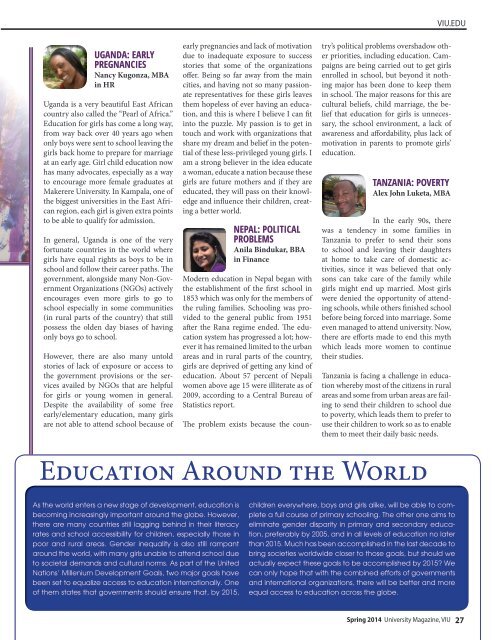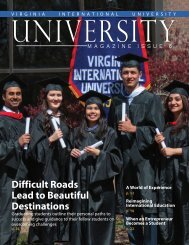University Magazine Issue 1
Create successful ePaper yourself
Turn your PDF publications into a flip-book with our unique Google optimized e-Paper software.
VIU.EDU<br />
UGANDA: EARLY<br />
PREGNANCIES<br />
Nancy Kugonza, MBA<br />
in HR<br />
Uganda is a very beautiful East African<br />
country also called the “Pearl of Africa.”<br />
Education for girls has come a long way,<br />
from way back over 40 years ago when<br />
only boys were sent to school leaving the<br />
girls back home to prepare for marriage<br />
at an early age. Girl child education now<br />
has many advocates, especially as a way<br />
to encourage more female graduates at<br />
Makerere <strong>University</strong>. In Kampala, one of<br />
the biggest universities in the East African<br />
region, each girl is given extra points<br />
to be able to qualify for admission.<br />
In general, Uganda is one of the very<br />
fortunate countries in the world where<br />
girls have equal rights as boys to be in<br />
school and follow their career paths. The<br />
government, alongside many Non-Government<br />
Organizations (NGOs) actively<br />
encourages even more girls to go to<br />
school especially in some communities<br />
(in rural parts of the country) that still<br />
possess the olden day biases of having<br />
only boys go to school.<br />
However, there are also many untold<br />
stories of lack of exposure or access to<br />
the government provisions or the services<br />
availed by NGOs that are helpful<br />
for girls or young women in general.<br />
Despite the availability of some free<br />
early/elementary education, many girls<br />
are not able to attend school because of<br />
early pregnancies and lack of motivation<br />
due to inadequate exposure to success<br />
stories that some of the organizations<br />
offer. Being so far away from the main<br />
cities, and having not so many passionate<br />
representatives for these girls leaves<br />
them hopeless of ever having an education,<br />
and this is where I believe I can fit<br />
into the puzzle. My passion is to get in<br />
touch and work with organizations that<br />
share my dream and belief in the potential<br />
of these less-privileged young girls. I<br />
am a strong believer in the idea educate<br />
a woman, educate a nation because these<br />
girls are future mothers and if they are<br />
educated, they will pass on their knowledge<br />
and influence their children, creating<br />
a better world.<br />
NEPAL: POLITICAL<br />
PROBLEMS<br />
Anila Bindukar, BBA<br />
in Finance<br />
Modern education in Nepal began with<br />
the establishment of the first school in<br />
1853 which was only for the members of<br />
the ruling families. Schooling was provided<br />
to the general public from 1951<br />
after the Rana regime ended. The education<br />
system has progressed a lot; however<br />
it has remained limited to the urban<br />
areas and in rural parts of the country,<br />
girls are deprived of getting any kind of<br />
education. About 57 percent of Nepali<br />
women above age 15 were illiterate as of<br />
2009, according to a Central Bureau of<br />
Statistics report.<br />
The problem exists because the coun-<br />
try’s political problems overshadow other<br />
priorities, including education. Campaigns<br />
are being carried out to get girls<br />
enrolled in school, but beyond it nothing<br />
major has been done to keep them<br />
in school. The major reasons for this are<br />
cultural beliefs, child marriage, the belief<br />
that education for girls is unnecessary,<br />
the school environment, a lack of<br />
awareness and affordability, plus lack of<br />
motivation in parents to promote girls’<br />
education.<br />
TANZANIA: POVERTY<br />
Alex John Luketa, MBA<br />
In the early 90s, there<br />
was a tendency in some families in<br />
Tanzania to prefer to send their sons<br />
to school and leaving their daughters<br />
at home to take care of domestic activities,<br />
since it was believed that only<br />
sons can take care of the family while<br />
girls might end up married. Most girls<br />
were denied the opportunity of attending<br />
schools, while others finished school<br />
before being forced into marriage. Some<br />
even managed to attend university. Now,<br />
there are efforts made to end this myth<br />
which leads more women to continue<br />
their studies.<br />
Tanzania is facing a challenge in education<br />
whereby most of the citizens in rural<br />
areas and some from urban areas are failing<br />
to send their children to school due<br />
to poverty, which leads them to prefer to<br />
use their children to work so as to enable<br />
them to meet their daily basic needs.<br />
Education Around the World<br />
As the world enters a new stage of development, education is<br />
becoming increasingly important around the globe. However,<br />
there are many countries still lagging behind in their literacy<br />
rates and school accessibility for children, especially those in<br />
poor and rural areas. Gender inequality is also still rampant<br />
around the world, with many girls unable to attend school due<br />
to societal demands and cultural norms. As part of the United<br />
Nations’ Millenium Development Goals, two major goals have<br />
been set to equalize access to education internationally. One<br />
of them states that governments should ensure that, by 2015,<br />
children everywhere, boys and girls alike, will be able to complete<br />
a full course of primary schooling. The other one aims to<br />
eliminate gender disparity in primary and secondary education,<br />
preferably by 2005, and in all levels of education no later<br />
than 2015. Much has been accomplished in the last decade to<br />
bring societies worldwide closer to those goals, but should we<br />
actually expect these goals to be accomplished by 2015? We<br />
can only hope that with the combined efforts of governments<br />
and international organizations, there will be better and more<br />
equal access to education across the globe.<br />
Spring 2014 <strong>University</strong> <strong>Magazine</strong>, VIU<br />
27

















